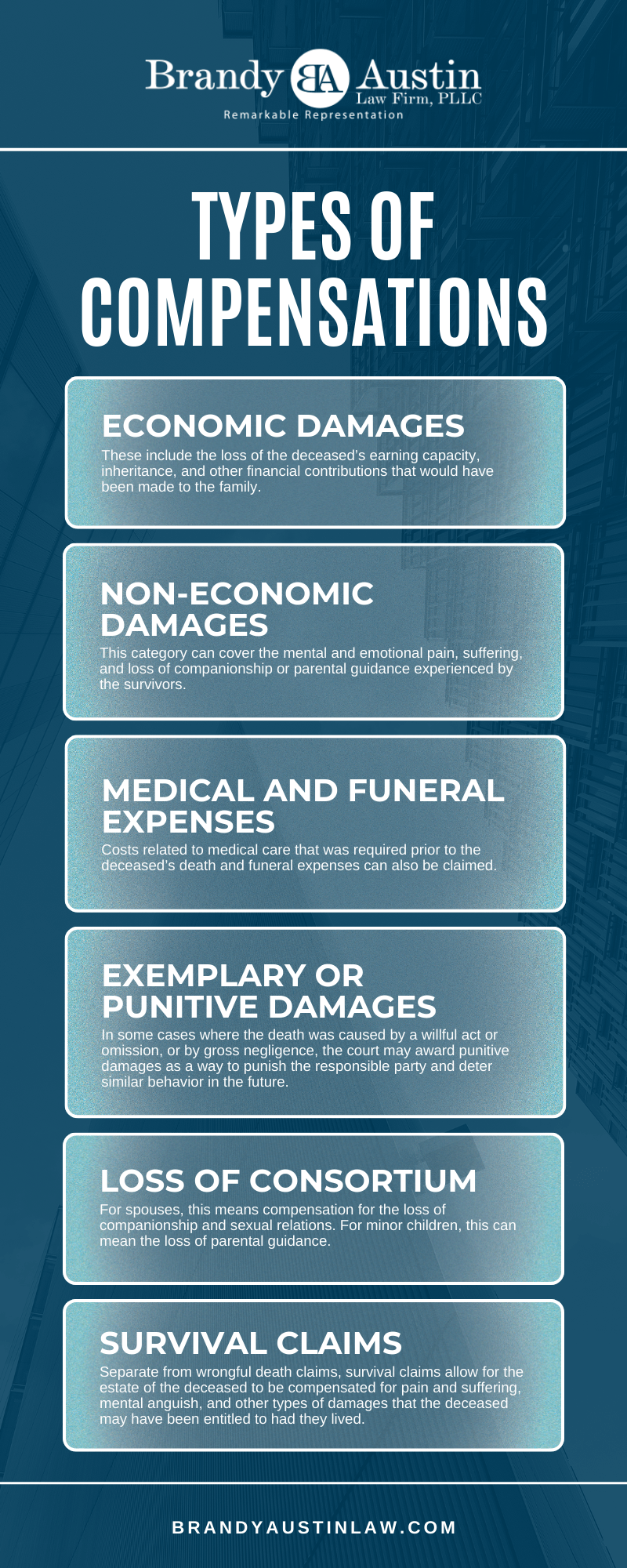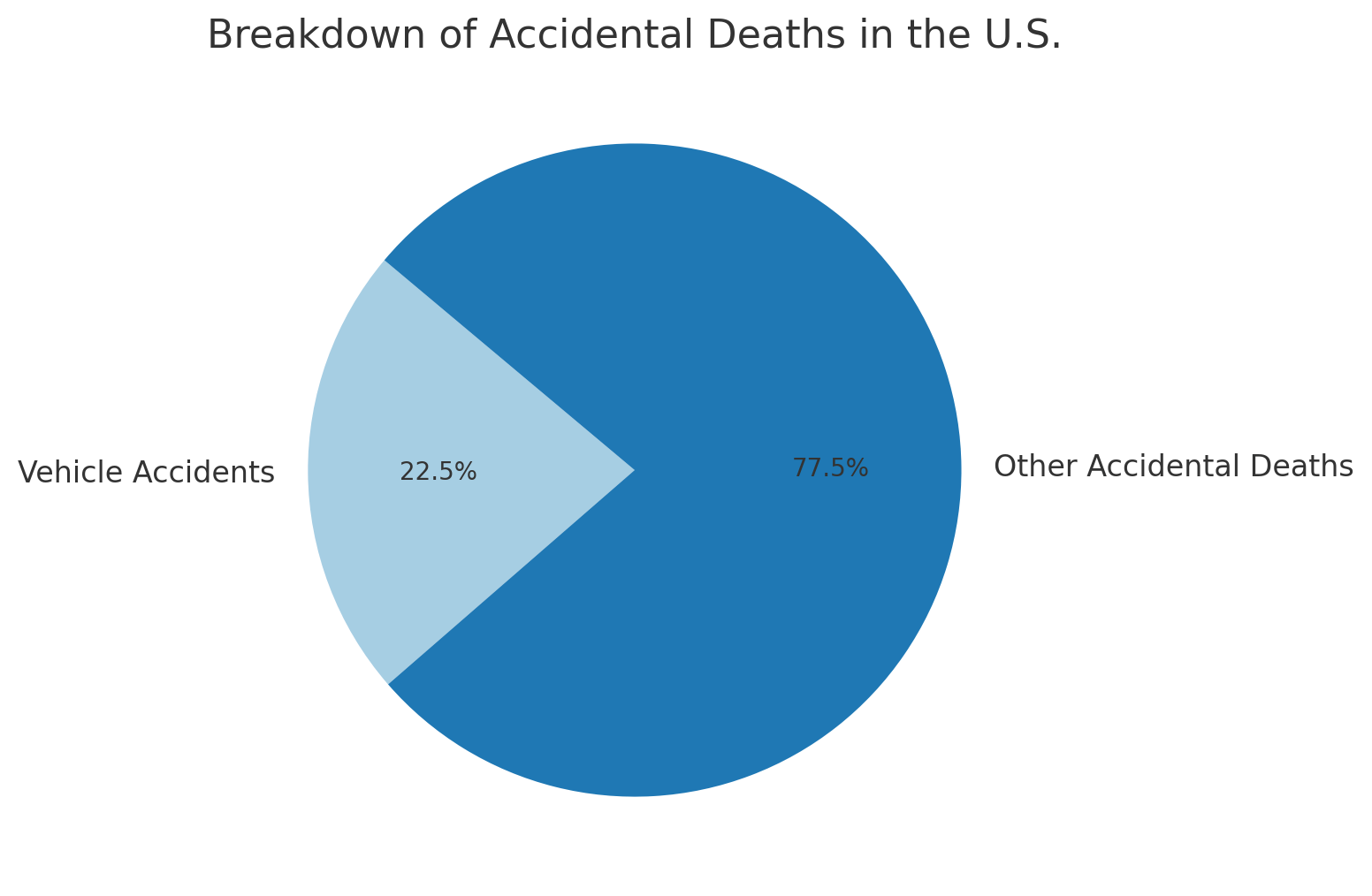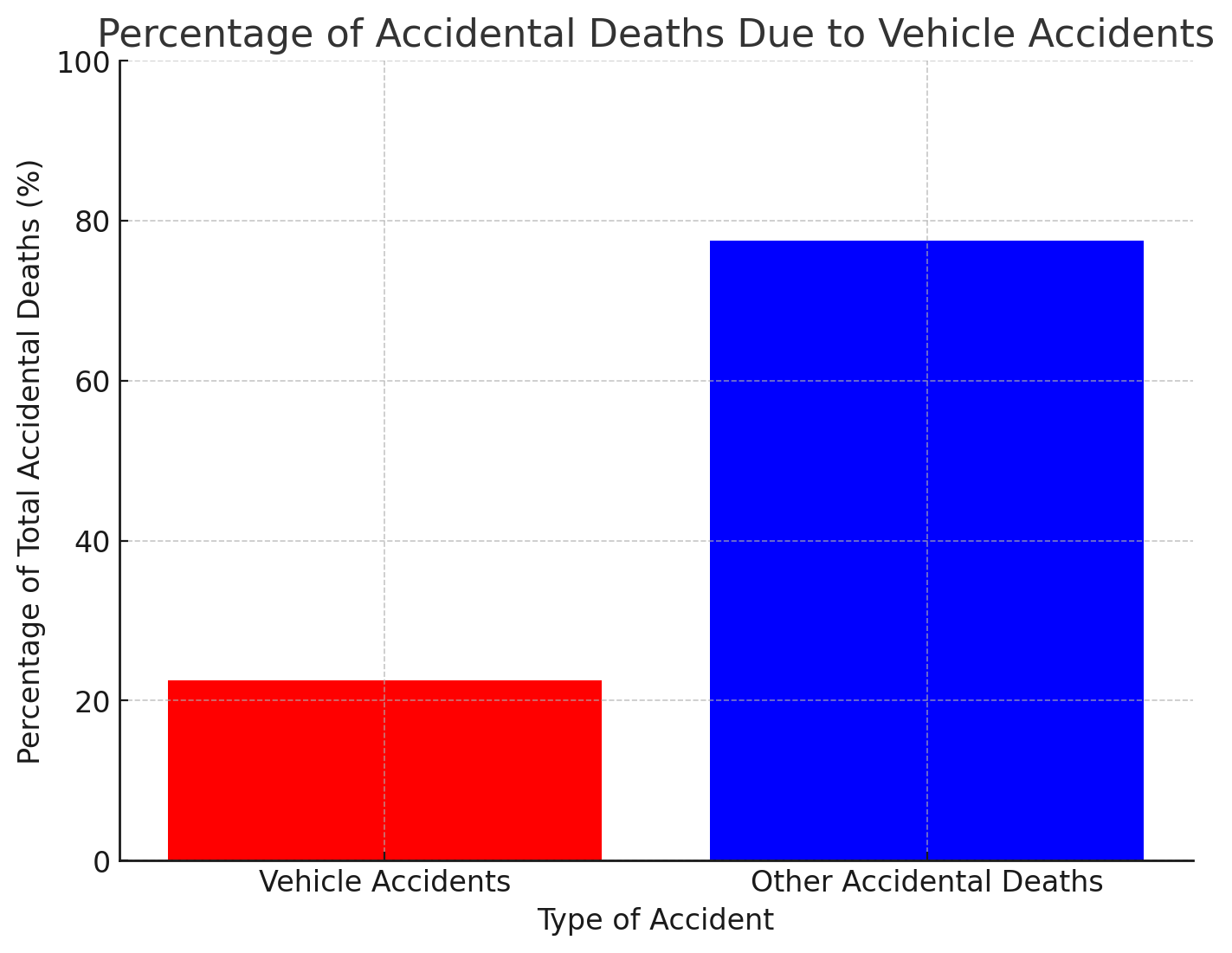
Your Dedicated Wrongful Death Lawyer
Our Dallas, TX wrongful death lawyer knows that losing a loved one is one of the most painful experiences a family can endure. When that loss is caused by someone else’s negligence or wrongdoing, the pain is compounded by feelings of anger, frustration, and injustice. We are here to help you seek justice for your loss and hold the responsible party accountable.
While no legal action can truly replace your loved one, filing a wrongful death claim can ease the financial burden left behind. We are committed to guiding you through this challenging process with compassion and personalized attention, helping you secure the compensation your family deserves for both your emotional and financial losses. Contact Brandy Austin Law Firm today.
Eligibility for Filing a Wrongful Death Claim
In Texas, the law allows specific family members to file a wrongful death claim, including:
- Spouse: The surviving spouse of the deceased.
- Children: Both biological and legally adopted children.
- Parents: The mother or father of the deceased individual.
If the immediate family members choose not to file a claim within three months of the death, the estate’s executor or personal representative may do so on behalf of the family. However, family members can request that the estate not proceed with the lawsuit. We are here to help you understand these legal requirements and determine the best approach for your situation.
Importance of Timely Action
In Texas, the statute of limitations for filing a personal injury claim is typically two years from the date of the deceased’s death. Therefore, it’s essential to consult with our wrongful death attorney as soon as possible so that your rights are protected.
Losing a loved one is an unimaginable tragedy, and dealing with the legal consequences can be overwhelming. If you believe you have a wrongful death claim in Dallas, Texas, it’s essential to seek professional legal assistance. We invite you to reach out to us for a consultation. Our team is dedicated to guiding you through every step of the process with empathy and knowledge.
Wrongful death claims in Dallas, Texas, are a complicated legal area reserved for specific family members of the deceased. With the support of our knowledgeable Dallas wrongful death lawyer families can seek the justice and compensation they deserve.
Compensation for Wrongful Death Victims
While no amount of money can replace your loved one, a wrongful death claim can help your family recover compensation for the financial and emotional impact of your loss. In Texas, damages may include:
- Medical Expenses: Costs for medical care provided before your loved one’s death.
- Funeral and Burial Costs: Expenses related to laying your loved one to rest.
- Loss of Income: Compensation for the wages your loved one would have earned if they had lived.
- Loss of Companionship and Support: Emotional damages for the loss of love, guidance, and care.
- Pain and Suffering: Compensation for the mental anguish your family has experienced due to the loss.
- Punitive Damages: In cases involving gross negligence or intentional harm, punitive damages may be awarded to punish the wrongdoer.
We work closely with financial experts to accurately calculate the types of damages you are entitled to, so that all your family’s current and future needs are considered.
Proving Wrongful Death in Texas
Proving a wrongful death in Texas is a challenging process that requires a deep understanding of the law and a meticulous approach to gathering and presenting evidence. As personal injury lawyers in Dallas, TX, our team is well-versed in handling these difficult cases. We aim to provide a comprehensive overview of how to prove wrongful death in Texas, highlighting the critical steps and considerations involved.
Understanding Wrongful Death
Wrongful death occurs when an individual dies due to the negligence or misconduct of another person or entity. In Texas, the wrongful death statute allows certain family members to seek compensation for their loss. However, proving wrongful death involves several key elements.
The Key Elements of a Wrongful Death Claim
To establish a wrongful death case in Texas, the following elements must be proven:
- Negligence: Demonstrating that the death was caused by the negligence, carelessness, or unskillfulness of another party.
- Breach of Duty: Establishing that the defendant owed a duty to the deceased and that this duty was breached.
- Causation: Showing a direct link between the defendant’s actions and the death of the individual.
- Damages: Providing evidence of the financial and emotional losses resulting from the death.
At Brandy Austin Law, we approach each personal injury claim with a thorough and compassionate strategy. Our personal injury attorneys, are committed to building a strong case on behalf of our clients by focusing on the following areas:
Investigating the Incident
A detailed investigation is critical in a wrongful death case. We gather evidence, interview witnesses, and, if necessary, consult with specialists to reconstruct the events leading to the death. This may involve analyzing accident reports, medical records, and other relevant documents.
Establishing Negligence
Proving negligence is central to a wrongful death claim. We work tirelessly to demonstrate how the defendant’s actions or inactions deviated from what a reasonably prudent person would have done under similar circumstances.
Demonstrating Breach of Duty
Every wrongful death case hinges on establishing a breach of duty. Whether it’s a driver’s duty to follow traffic laws, a manufacturer’s duty to produce safe products, or a doctor’s duty to provide standard medical care, we aim to show how this duty was not met.
Linking Causation
We emphasize the causal relationship between the breach of duty and the resulting death. This often requires expert witness testimony to show how the defendant’s actions were directly responsible for the loss of life.
Quantifying Damages
Determining the damages and liability in a wrongful death case involves both economic and non-economic factors. Economic damages include medical bills, funeral costs, and lost future earnings. Non-economic damages cover pain and suffering, loss of companionship, and emotional distress.
How to File A Wrongful Death Injury Claim in Dallas
Legal professionals, like those at Brandy Austin Law, can provide more personalized guidance tailored to your specific case. We outline the steps of pursuing a wrongful death claim.
- Gather Evidence
Collect all possible evidence related to your loved one’s passing. This can include medical records, witness accounts, death certificates, and any other documents that can support your claim.
- Consult a Lawyer
It’s advisable to consult with our personal injury lawyer as soon as possible. We can offer advice tailored to your specific situation and guide you through the personal injury legal process.
- Notify the Responsible Party
The next step usually involves sending a notification to the person or entity you believe is responsible for your injury. This could be an individual, a company, or even a governmental body.
- File an Insurance Claim
If applicable, file a claim with the responsible party’s insurance company. Our attorney can assist with this, helping you manage the challenges and pitfalls that can come with insurance claims.
- Initiate Legal Proceedings
If we cannot reach a satisfactory personal injury case settlement through negotiation or mediation, our lawyer may recommend filing a formal personal injury lawsuit.
- Discovery and Litigation
Both parties will then gather evidence in a phase known as discovery. This could involve interrogations, depositions, and the gathering of documents.
- Negotiation and Settlement
Often, a settlement is reached before going to trial. Our lawyer will negotiate on your behalf to try to secure the most favorable terms possible.
- Trial
If a settlement can’t be reached, your case will proceed to trial, where a judge or jury will decide on the outcome.
- Collect Your Settlement or Award
If you win your case, the final step is the collection of your settlement or award. Keep in mind that this can sometimes be a lengthy process, depending on various factors.
Dallas Wrongful Death Infographic
Dallas Wrongful Death Statistics
According to the Centers for Disease Control and Prevention (CDC), more than 200,000 people are killed in the U.S. each year due to accidental injury. Accidental injuries has now been named as the fourth leading cause of death in the country. Vehicle accidents are the most common causes of these fatalities, responsible for the deaths of more than 45,000 victims each year.
Wrongful Death FAQs
Can I Sue for Wrongful Death in Texas?
Yes, you can sue for wrongful death in Texas if you are a qualifying family member or representative of someone who has died due to another party’s negligence, misconduct, or intentional harm. Under Texas law, the spouse, children, and parents of the deceased are typically eligible to file a wrongful death claim. These claims aim to secure compensation for financial and emotional losses suffered by the family and may include damages like loss of income, medical expenses, and emotional suffering. Consulting with our experienced legal professionals is essential to take on the aspects of a wrongful death lawsuit effectively.
What Damages Can Be Recovered for Wrongful Death in Texas?
In Texas, various types of damages may be recoverable in a wrongful death claim, depending on the specifics of the case. Generally, these damages can include economic losses such as lost earnings, inheritance, and medical and funeral expenses. Non-economic damages for mental anguish, pain and suffering, and loss of companionship or parental guidance may also be awarded. In certain egregious cases, punitive or exemplary damages might be levied against the defendant to deter similar future conduct. Each case is unique, so consulting with our personal injury attorney can help you understand the scope of damages you might be eligible to recover.
How Are Wrongful Death Claims Divided in Texas?
In Texas, the distribution of wrongful death proceeds depends on the parties involved in the claim and the relationships they had with the deceased. Generally, the damages awarded in a wrongful death suit are divided among the surviving spouse, children, and parents of the deceased. Texas law provides some flexibility in how the court allocates these funds, and it usually takes into account factors such as the degree of dependency on the deceased and the extent of the suffering caused by the loss. If the claim is brought by the executor or personal representative of the estate, any awarded damages go to the estate and are distributed according to the deceased’s will or, if there is no will, according to Texas intestacy laws. For personalized guidance on this complicated issue, consult with our experienced legal professionals at Brandy Austin Law.
How Long Do I Have to File a Wrongful Death Claim in Texas?
In Texas, the statute of limitations for filing a wrongful death claim is generally two years from the date of the individual’s death. This means you have a two-year window to initiate legal proceedings. There are certain exceptions that could either extend or shorten this time frame, such as if the defendant leaves the state or if the claim involves a governmental entity. Due to the time-sensitive nature of these cases, it’s vital to consult with our wrongful death attorney as soon as possible to make sure that you don’t miss the opportunity to seek justice and compensation for your loss.
Dallas Wrongful Death Glossary
Our Dallas, TX wrongful death lawyer has the knowledge and experience needed to help clients throughout their legal journey. At Brandy Austin Law Firm, we want our clients to understand all the legal terms associated with their cases.
Beneficiary
A beneficiary is an individual who is legally entitled to receive benefits, compensation, or assets from an estate, trust, life insurance policy, or legal settlement. In the context of a wrongful death claim, beneficiaries are typically the surviving family members or dependents of the deceased. These may include spouses, children, parents, or, in some cases, more distant relatives who were financially dependent on the deceased. Beneficiaries play a pivotal role in wrongful death lawsuits as they are the ones seeking compensation for the loss of financial support, companionship, and other damages resulting from the untimely death of their loved one. The eligibility of a person to be classified as a beneficiary varies depending on state laws and the specific circumstances surrounding the death.
Cause Of Action
A cause of action refers to the specific legal grounds upon which a lawsuit is based. It represents the legal theory that supports a plaintiff’s claim against a defendant. In wrongful death cases, the cause of action usually stems from allegations that the defendant’s negligent, reckless, or intentional conduct directly resulted in the victim’s death. To successfully pursue a wrongful death claim, the plaintiff must establish key elements such as duty of care (the defendant had a legal obligation to act responsibly), breach of duty (the defendant failed to meet that obligation), causation (the breach directly led to the victim’s death), and damages (the survivors suffered losses as a result). Our Dallas wrongful death lawyers understand that a well-founded cause of action is essential for moving forward with litigation and obtaining compensation for the deceased’s survivors.
Burden Of Proof
This refers to the legal obligation of the plaintiff (the party bringing the lawsuit) to establish their claims with sufficient evidence in court. In wrongful death cases, the burden of proof rests on the plaintiff, who must demonstrate that the defendant’s negligence, recklessness, or intentional misconduct directly caused the victim’s death. Unlike criminal cases, which require proof “beyond a reasonable doubt,” wrongful death claims are civil cases where the plaintiff must prove their case by a “preponderance of the evidence,” meaning it is more likely than not that the defendant’s actions led to the fatal outcome.
Pecuniary Losses
Also known as economic damages, these refer to the financial hardships that surviving family members endure due to the wrongful death of a loved one. Such losses may include lost income or wages that the deceased would have earned throughout their lifetime, medical expenses incurred before death, funeral and burial costs, loss of benefits (such as health insurance or pension plans), and even loss of household services. Courts may also consider the value of lost inheritance that would have been passed down to the deceased’s heirs. The purpose of awarding pecuniary losses is to help financially compensate the surviving family for the tangible economic impact of their loved one’s untimely passing.
Survival Action
A survival action is a legal claim that allows the estate of the deceased person to seek damages for the pain, suffering, and losses the decedent endured before their death. Unlike wrongful death claims, which compensate surviving family members for their losses, a survival action focuses on what the deceased individual would have been entitled to had they survived. This can include compensation for medical bills, lost wages, and conscious pain and suffering experienced before passing. In some cases, survival actions and wrongful death claims are pursued simultaneously to ensure all damages are accounted for in the legal process.
Brandy Austin Law Firm, Dallas Wrongful Death Lawyer
Trammell Crow Center, 2001 Ross Ave 700 125, Dallas, TX 75201
Contact Our Dallas Wrongful Death Lawyer Today
If you have lost a loved one due to someone else’s negligence, contact us at Brandy Austin Law Firm. We know how difficult this time is for your family, and we are committed to helping you seek justice and financial relief. Let us handle the legal process while you focus on healing. Call today to schedule a consultation and learn more about how we can assist you through this challenging time and strengthen your personal injury case.









